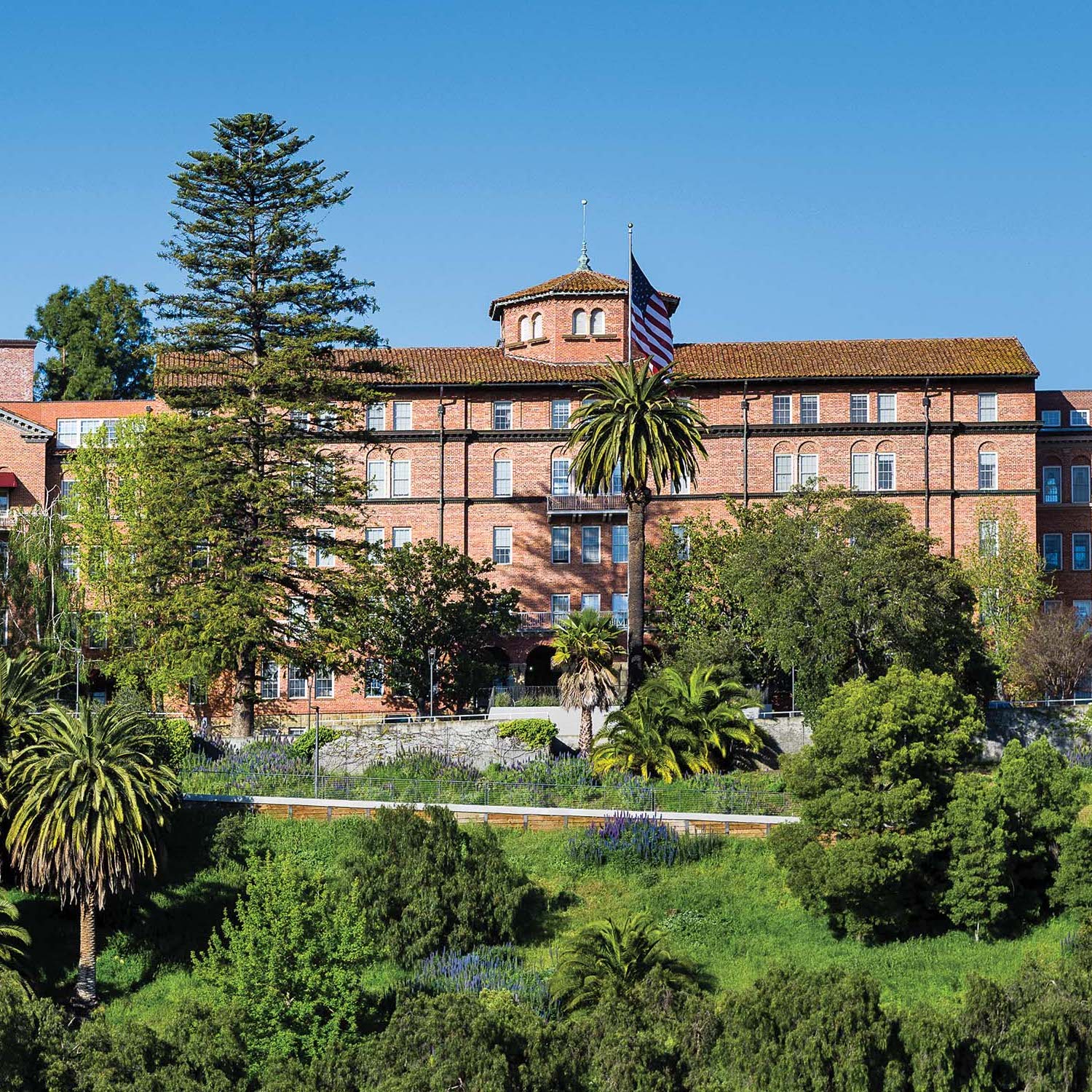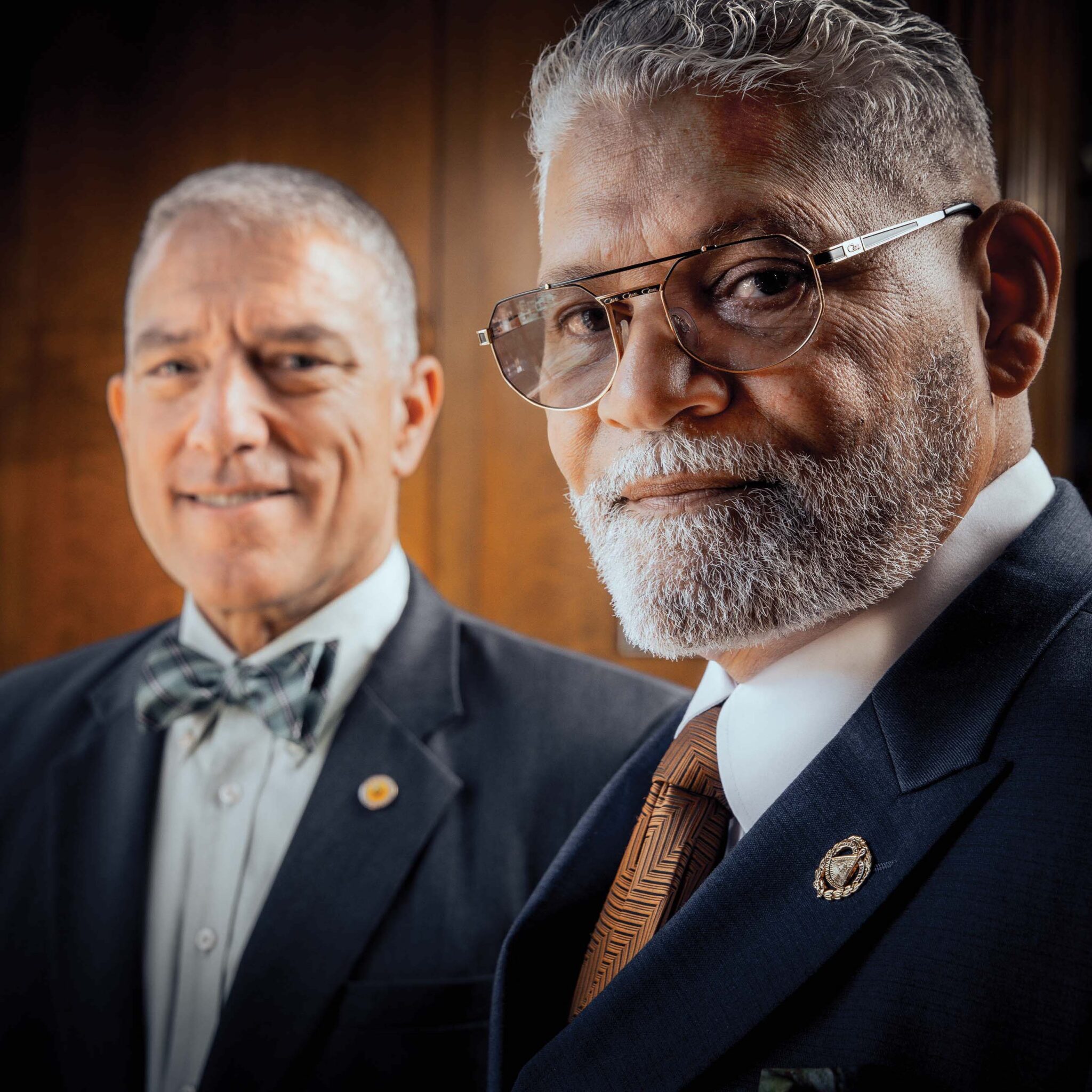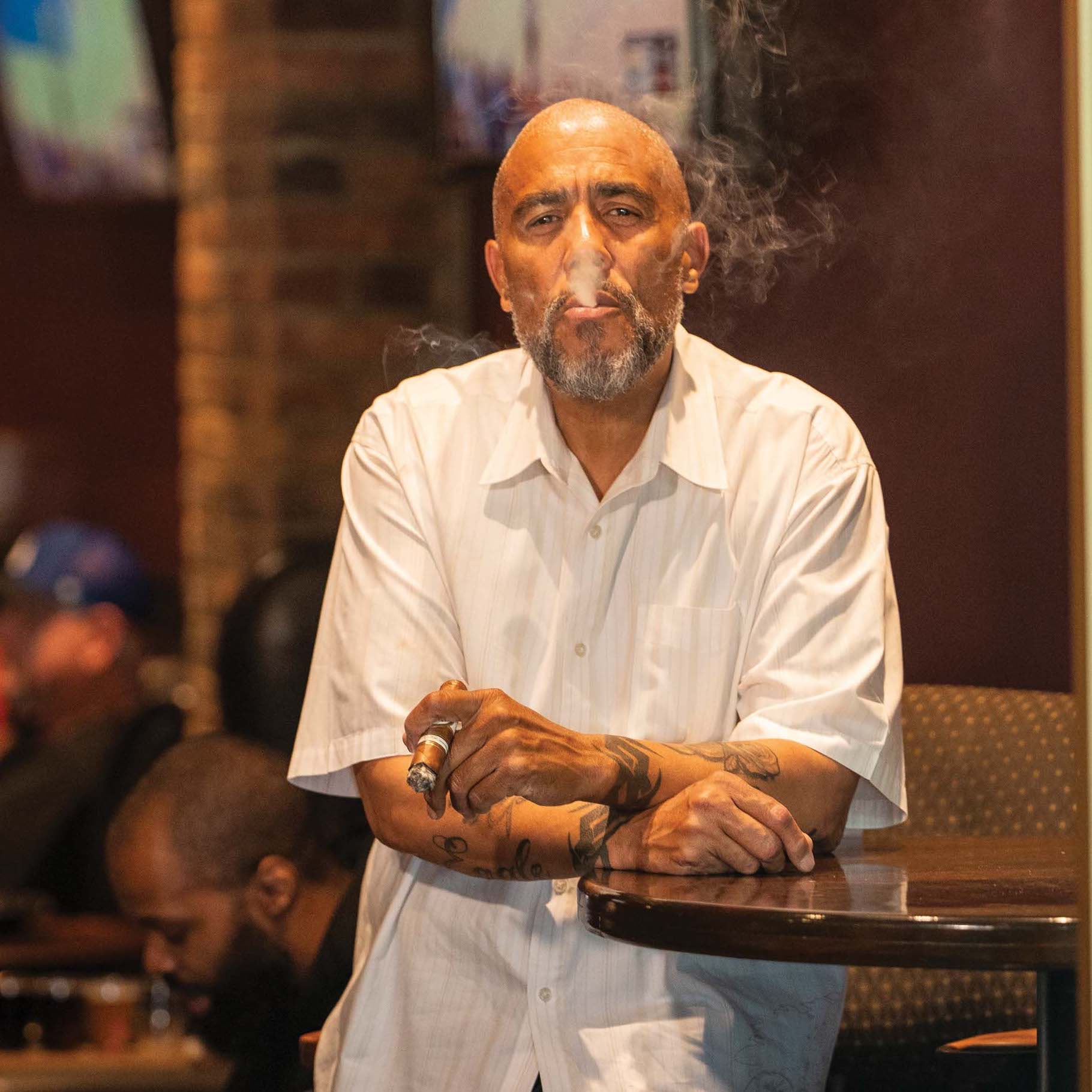
The Masonic Homes of California, Now a Home for All California Masons
For the first time, Prince Hall Masons have access to relief through the Masonic Homes of California.

By Chernoh M. Sesay, Jr.
Above: Stained glass art by Nzilani Glass Conservation
Almost 250 years ago, approximately 15 Black men, some perhaps African and the rest probably North American–born, traveled under the cover of night across Boston Harbor. Their destination was Castle Island, where the 38th British Foot Infantry was stationed and where, within it, operated a Masonic lodge of the Irish Registry, known as Lodge № 441. The traveling group, all free men, would have been on high alert: For one thing, fraternizing with British soldiers would invite allegations of loyalism. But also, the group was there for another, practically unheard-of reason: They wanted to become Freemasons.
Today that fateful trek across the harbor does not loom as large in the public mind as Washington’s crossing of the Delaware or Paul Revere’s midnight ride, to name two other colonial moments with Masonic connections. And yet its ramifications were, in many ways, every bit as significant. Centuries later, they continue to resonate all around the globe.
It was there, in Boston, under the supervision of the lodge master (likely a man named John Batt), that the first group of African American men were initiated into Freemasonry. Within a decade, they had formed the first Black lodge in the country (and presumably the world), from which a vast network would emerge connecting some of the most important figures of their time. Those men, in turn, would help shape and drive the movements for the abolition of slavery, for Black education, and for civil rights, establishing the Masonic lodge as a crucial institution in colonial Black American history—and American history writ large.
In forming an all-Black lodge, the group altered the course of Masonic history. The African Lodge, as it was originally known, became the first formal and public-facing institution of African-descended people in all of North America, predating even the founding of the African Methodist Episcopal Church in Philadelphia. This was enormously consequential in its own time, with ramifications that continue to be felt today.
Within the story of African Lodge, one man stands out: Prince Hall. His leadership was essential not just for the United States and much of the globe.
To be clear: Prince Hall Freemasonry is Freemasonry. It is essentially no different in terms of ritual or form from conventional Masonry. (To borrow a bit of fraternal lingo, it is widely considered “regular.”) However, a complex and difficult racial history has meant that while Prince Hall Freemasonry is recognized today as legitimate within the craft, its history and development took place outside of and in parallel to mainstream American Masonry. In that way, the stories of African Lodge and Prince Hall reflect major issues not only in Masonic history, but also in American and transatlantic history. African Lodge shaped and was shaped by major historical themes including slavery and racism, abolition, the American Revolution, and the growth of free Black communities. And from that, it birthed generations of Black leadership and activism.
And behind that immense legacy, there is the man. Prince Hall is one of the most important figures of the 18th century. And yet historians have not fully acknowledged the centrality of Hall or the African Lodge in understanding freedom and citizenship during the Revolutionary era. Hall is, in many ways, one of the overlooked founding fathers of this country. Both within the fraternity and outside it, he continues to cast a long shadow.
Above: Prince Hall Masons gathered in April for the 11th biennial reopening of African Lodge № 459 in Boston, the lodge founded by Prince Hall in the 1780s. Masonic leaders participated as line officers in the ceremonial reopening of the lodge dressed in period-appropriate garb.
So, who was Prince Hall? Relatively little is known about his life before he rose to prominence as a public leader. His death was widely publicized in newspapers, so we know that he passed in 1807 at the age of 72. We know that other men living in Boston who were of African descent shared his name; however, several can be removed from consideration as Prince Hall the Mason due to their age or the date of their death. At the same time, Hall’s biography remains frustratingly opaque. This is both unsurprising and significant. Anyone who has performed genealogical research for people of African descent who lived during slavery will attest to that difficulty.
Hall’s biography, or really the lack of it, illustrates this challenge. For example, we know where Hall was buried, but not where he was born. The important Masonic historian William H. Grimshaw, writing at the turn of the 20th century, claimed that Hall was born in Barbados and traveled to North America in 1765. This suggestion, while tantalizing and frequently repeated by historians, was never attributed to any documentation. Despite the possibility of Hall’s Caribbean origins, historians still have not found clear evidence of his birthplace. It is very probable that an enslaved man named Prince, who was freed in 1770 after 21 years of ownership by William and Margarett Hall of Boston, was the man who would eventually help found African Lodge. William Hall had worked as a leather dresser, and so too did Prince Hall, who was later noted as such by public authorities and recorded as having furnished leather drumheads to the Continental Army. (Some scholars have inferred that Prince Hall might not have been enslaved, but rather that he was apprenticed to William Hall.)
Prince Hall had a family, but here again, genealogical records raise more questions than they answer. Pro-bate records detail definitively that Hall the Mason left his estate to his final wife, Sylvia Hall (listed as Zilpha in some instances, maiden name Johnson). Hall was one of just a few Black people in late-18th-century Massachusetts who left a will and a small amount of probated wealth. He listed his Masonic apron among his possessions, and he made Sylvia the executor of his estate. Marriage records suggest that Hall was married more than once and that he last wed in 1804. He had at least one child, Primus Hall; however, Primus remembered that when he was born, in 1756, his father was free and that his mother, Delia Hall, was enslaved. Primus’s memory of his father having been free conflicts with William and Margarett Hall’s manumission statement that they had owned Prince as early as 1749.
Above: Grand Master Justin Petty of the Prince Hall Grand Lodge of Massachusetts prepares for a rededication ceremony.
Despite these biographical gaps and unanswered questions, we know that at the age of 42, just after establishing African Lodge and during the Revolutionary War, Prince Hall emerged onto the public scene. In January 1777, Hall and seven other men penned an abolitionist petition to the Massachusetts House of Representatives. Three of the signees—Hall, Peter Bestes, and Brister Slensen (Slenser in some records)—were by 1777 already members of African Lodge. A fourth, Lancaster Hill, joined just after. This appeal was the last in a series of addresses begun in 1773 and sent by a Black-led interracial group to the Massachusetts government. This campaign was the earliest of its kind in the history of American abolitionism, and the fact that it was led by the first Black American Freemasons has not received its just and proper attention. Black people in colonial America had always resisted their enslavement, but prior to the letter-writing campaign, that resistance had typically been expressed on personal terms or by invoking the particular treatment of an individual. Hall and the other Black petitioners stridently criticized the morality and legality of slavery, echoing the ideas of human equality and natural rights found in Masonic ritual and the Declaration of Independence. They also created direct political ties with white legislators and the broader Massachusetts public. As power shifted from loyalists to patriots, Hall demonstrated astute political instincts as he called out the hypocrisy of a rebellion that condoned slavery, while also culling favor among whites sympathetic to emancipation.
It’s also important to remember that this abolitionist movement conjoined with several judicial anti-slavery cases brought by the enslaved, as well as examples of owners personally emancipating their enslaved people in the context of expanding abolitionist sentiment. Because the campaign aligned with these other anti-slavery actions, it helped shape the debate about equality. For example, an early draft of the Massachusetts state constitution, adopted in 1780, denied the vote to any person of African descent. The broader public rebutted this proscription, and the final version declared unequivocally that all people were equal. Interestingly, the state constitution also allowed each town to decide its own rules for Black suffrage. Despite the limits and ambiguities of slavery’s end in Massachusetts, Freemasons of color led the charge to guarantee political rights for the state’s emancipated population.
From 1777 forward, Prince Hall’s name appeared time and again in connection with protests for equality. To that end, he exercised determined leadership on two fronts: He led several efforts for Black people’s rights, and he worked tirelessly to gain full Masonic recognition for African Lodge.
Masonic recognition was no small matter. Hall was aware that Revolutionary-era frictions between loyalists and patriots created deep divisions among American Freemasons (often political elites), and also that the contingencies of racism might lead white Masons to question the legitimacy of an all-Black lodge—thereby severing a pipeline into middle-class respectability. So Hall approached white Masonic leaders in both America and England. Despite differing accounts, we know that Hall had gained a provincial charter for African Lodge № 1 from John Rowe, who by 1768 had been made the provincial grand master of North America by English Masons. At least as early as 1779, Hall also began a correspondence with English Masons, and it was just after the war’s end, in 1784, that Hall formally petitioned the Grand Lodge in London to convey a full charter to African Lodge. In 1787, African Lodge № 1 received its warrant from London and became listed on official Masonic rolls as African Lodge № 459. (After Hall’s death, African Lodge took his name and, together with a small network of other Black lodges in Philadelphia and the Northeast, declared itself the seat of a Prince Hall Grand Lodge.)
Above: Close-up of California Grand Master David San Juan’s 18th century waistcoat.
Outside the lodge, Hall developed into one of the era’s most important voices. As an abolitionist, Hall was an ambivalent American patriot, simultaneously hopeful and cynical. As a leader among a generation of people who had successfully won their freedom, he imagined and worked for a future of equal and nonracial citizenship. Masonry inspired his optimism. Hall believed deeply in the sacred history of the craft and in Masonry’s emphasis on universal brotherhood. This spoke to his concerns about ending slavery and supporting Black education. For Hall, Masonic learning represented fundamental knowledge, and Masonic ritual provided an institutional framework for building leadership and demonstrating interracial equality. However, he was also hesitant because he recognized the difference between emancipation from enslavement and full acceptance into American society.
The tensions between Hall’s optimism and his realism were reflected in a series of seemingly conflicting decisions. In the winter of 1786, Hall pledged the support of African Lodge to Gov. James Bowdoin to help quell the unrest of farmers in western Massachusetts. The following January, having just flexed their newfound political muscle, Hall and 73 other Black men signed a petition asking for state support to help them “Return to Africa, our native country … where we shall live among our equals, and be more comfortable and happy, than we can be in our present situation.” A few months after that, Hall and 35 other men of color solicited the board of the Boston selectmen (the town’s governing body), asking that the education of Black people be supported by public funds. Hall and his co-signers bemoaned the contradiction of having to pay taxes while Black children were kept out of public schools. These seemingly disconnected moves were not the result of Hall and his cohort’s indecision. Rather, he was a principled pragmatist. Deeply aware of political realities, Hall labored to give Black people a voice, to find or create an environment where they would be seen as capable and deserving citizens, and to emphasize the power of Black people’s intellect.
By the turn of the 19th century, Hall had successfully created a vibrant space within Freemasonry that has thrived all the way to the present.
It was in Prince Hall’s African Lodge that the leaders of Boston’s antislavery movement came to prominence. A century and a half later, Prince Hall lodges in the American South helped produce and organize many of the 20th-century leaders of the civil rights movement. Indeed, several of the towering figures in Black American history, from Duke Ellington to Thurgood Marshall to John Lewis, were proud Prince Hall Masons. Prince Hall lodges provided an avenue into professional circles where previously there had been none. From Prince Hall Freemasonry also emerged the Order of the Eastern Star, a significant sororal auxiliary organization. The connections made in lodge and the accessibility of assistance and relief for those in need have made Prince Hall Masonry, together with the various Black churches and later Black fraternal traditions, among the most important institutions of Black America.
Creating all this was no mean feat, as Hall constantly had to navigate perilous and intersecting spaces of racism, hardship, and inter-Masonic conflict. Because of Hall’s tireless advocacy and immense achievement, it is fitting that all those lodges that trace their history back to the African Lodge recognize themselves within the tradition of “Prince Hall Freemasonry.” Hall’s efforts have certainly benefited Black people in America, but his historical impact has also resulted in the global spread of Prince Hall Freemasonry. Just as important, Hall’s determination to establish African Lodge № 459 serves as a testament to the fundamental principle of Masonic universal brotherhood that initially inspired him.
Photograph by:
Simon Simard

For the first time, Prince Hall Masons have access to relief through the Masonic Homes of California.

Prince Hall Grand Master David San Juan and G. Sean Metroka of the Grand Lodge of California on deepening an important Masonic partnership.

Robert J. Eagle Spirit Sr., the next grand master of California Prince Hall Masonry, on supporting the fraternity’s philanthropic mission.